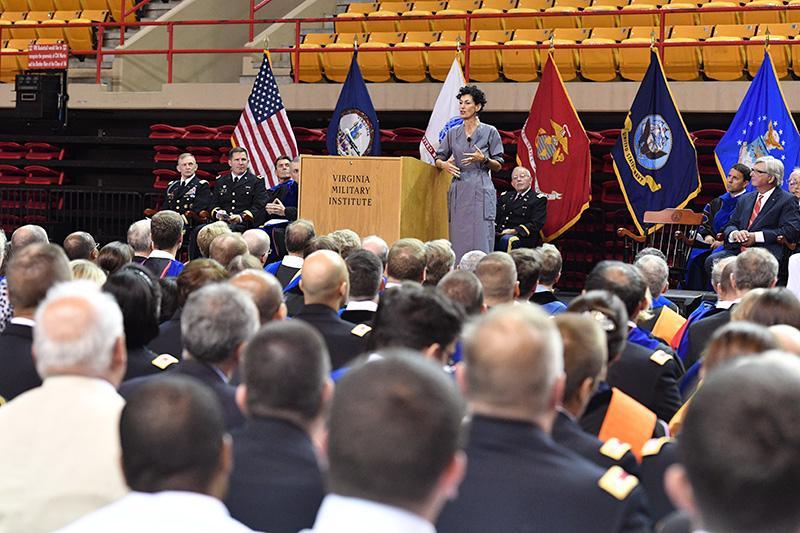‘The Implications of the Human Cloud’

Strategic futurist Nancy Giordano speaks at VMI's 2019-20 academic convocation Sept. 4.—VMI Photo by Kelly Nye.
LEXINGTON, Va., Sept. 4, 2019— Strategic futurist Nancy Giordano, who regularly meets with leaders of Fortune 500 organizations, told members of the VMI Corps of Cadets earlier today that they have more potential to change the world than most current industry leaders, as she addressed cadets, faculty, staff, and community members gathered in Cameron Hall for VMI’s 2019-20 academic convocation.
Giordano, a longtime TEDx curator with a background in advertising, told her listeners that a future shaped by factors such as artificial intelligence, robots, and drones must be undergirded by human qualities such as empathy, compassion, and integrity.
She began her remarks with an explanation of what she termed “the liminal gap” between old technologies that have been rendered obsolete and new ones that are being created daily. “It’s the space between what has existed then and what will exist next,” Giordano said of the liminal gap.
This gap, she noted, elicits a wide range of reactions from individuals, from nervousness to ambiguity to powerlessness. Giordano argued, though, that those who will thrive in the future are those who can recognize the opportunity to build a better world.
“The people who are built for action ... find this a very, very exciting time,” the speaker stated. “We get to rebuild so many of the things that may not be working for everyone. We get to come up with new solutions to improve people’s lives.”
Among those new solutions, she noted, are an Austin, Texas, company that has developed a method of 3-D printing a house in less than 24 hours, at a cost of less than $7,000. The company’s goal is to provide safe, affordable housing for poverty-stricken residents of Central America.
Yet others include software allowing people around the globe to remotely collaborate and build structures as intricate as an airplane wing in 3-D, machine learning tools that analyze an individual’s pronoun and emoji use to diagnose depression and risk of suicide, and hydroponic food production that has the potential to drive food prices down dramatically.
“These are the things that get me excited about the future and imagine wanting to deploy these technologies more and more quickly,” she stated.
Cutting-edge technologies and new tools are exciting, of course—but as the future becomes the present, it’s important to remain vigilant for downsides, Giordano noted.
“With this kind of advance comes tremendous responsibility,” she commented, adding that loneliness and anxiety seem to be increasing as technology accelerates, as do episodes of violence, educational disparities, and perhaps most chilling, the ability to digitally fake nearly anything.
In the wake of these huge waves of technological change and social upheaval, questions of privacy, inclusion, and ethics must rise to the forefront, Giordano cautioned. Referring back to an conversation she once had with technology industry leaders about cloud computing, Giordano asked, “What are the implications of the human cloud?”
A successful adaptation to a future that’s still being born, Giordano believes, will require five critical capacities. The first is curiosity. As Giordano reminded her listeners, “A constantly changing future requires a constant learner … There has never been a better time to be curious.”
The second is agency, which Giordano defined as “that sense that you have confidence and responsibility, that you can take action.” The CEO of a well-known technology company, she explained, tells job applicants that she’s hiring for FIO jobs, with the letters standing for “figure it out.”
Third is empathy and its critically important partner, compassion. And it’s time, Giordano said, to move past the outdated idea of empathy as a female quality. “[Empathy] is how you drive smart, human-centric design,” she said. “It’s how you build engaging teams that want to be a part of something.”
The fourth is grit, or relentless persistence. “Grit is not about avoiding things that are difficult. It’s about having the ability to survive and thrive through those things,” Giordano commented.
The fifth is integrity, because without it, technology will exploit rather than empower the user. “Trust is the most important thing that a person or an organization can cultivate,” Giordano stated.
In closing, Giordano reminded her listeners that the future will be built by them. “Don’t let my talk just sit here,” she counseled. “Show the rest of us how to navigate this dynamic new world with wonder and compassion and ingenuity and discipline.”
- Mary Price
-VMI-
.svg)
.png)